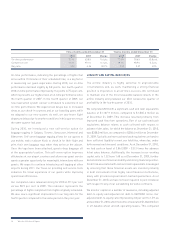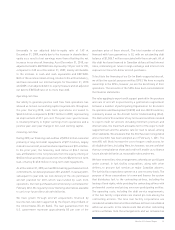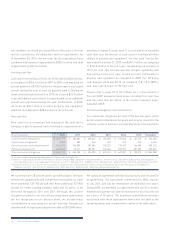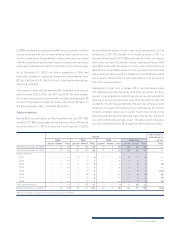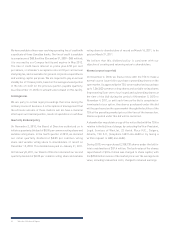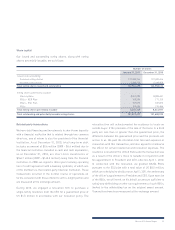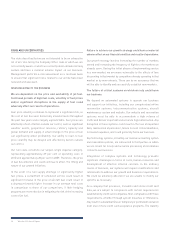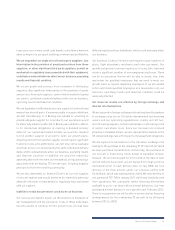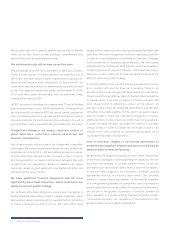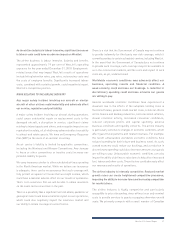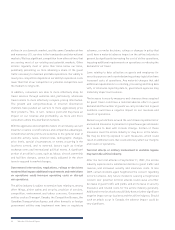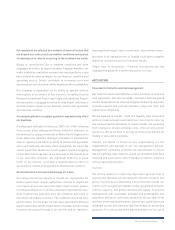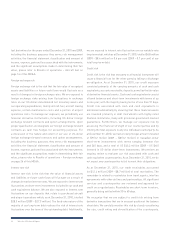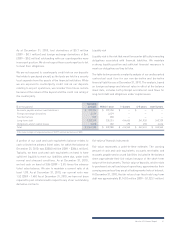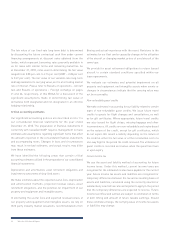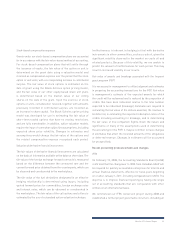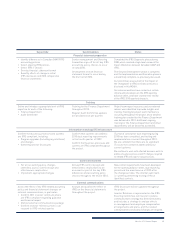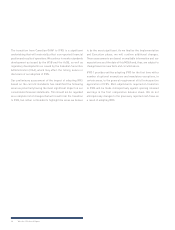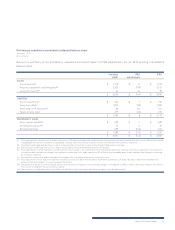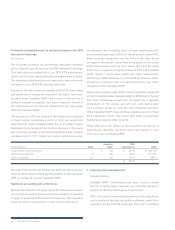Westjet 2010 Annual Report Download - page 40
Download and view the complete annual report
Please find page 40 of the 2010 Westjet annual report below. You can navigate through the pages in the report by either clicking on the pages listed below, or by using the keyword search tool below to find specific information within the annual report.
38 WestJet 2010 Annual Report
airlines in our domestic market, and the same Canadian airline
and numerous U.S. carriers in the transborder and international
markets. We face significant competition from other airlines that
are serving most of our existing and potential markets. Other
airlines regularly meet or price their fares below our fares,
potentially preventing us from attaining a share of the guest
traffic necessary to maintain profitable operations. Our ability to
meet price competition depends on our ability to operate at costs
lower than that of our competitors or potential competitors over
the medium to long term.
In addition, consumers are able to more effectively shop for
travel services through websites and, particularly, wholesale
travel sellers to more effectively compare pricing information.
The growth and competitiveness of Internet distribution
channels have pushed air carriers to more aggressively price
their products. This, in turn, reduces yield and may have an
impact on our revenue and profitability, as more and more
consumers utilize this distribution network.
With the aggressive and competitive nature of our industry, we turn
inwards to realize cost efficiencies and competitive advantages.
Conventional airline profits are sensitive to the general level of
economic activity, taxes, interest rates, demographic changes,
price levels, special circumstances or events occurring in the
locations served, and to external factors such as foreign
exchange rates and international political events. A significant
portion of an airline’s costs, such as labour, aircraft ownership
and facilities charges, cannot be easily adjusted in the short
term to respond to market changes.
Government intervention, regulations, rulings or decisions
rendered that impose additional requirements and restrictions
on operations could increase operating costs or disrupt
our operations.
The airline industry is subject to extensive laws relating to, among
other things, airline safety and security, provision of services,
competition, environment and labour concerns. Government
entities such as Transport Canada, the Competition Bureau, the
Canadian Transportation Agency, and other domestic or foreign
government entities may implement new laws or regulatory
schemes, or render decisions, rulings or changes in policy that
could have a material adverse impact on the airline industry in
general by significantly increasing the cost of airline operations,
imposing additional requirements on operations or reducing the
demand for air travel.
Laws relating to data collection on guests and employees for
security purposes and counterbalancing privacy legislation have
increased costs of operations. Any material changes that add
additional requirements to collecting, processing and filing data
with, or otherwise reporting data to, government agencies may
materially impact our business.
The increase in security measures and clearance times required
for guest travel could have a material adverse effect on guest
demand and the number of guests we carry. A reduction in guest
numbers could have a negative impact on our revenues and
results of operations.
Numerous jurisdictions around the world have implemented or
announced measures to penalize for greenhouse gas emissions
as a means to deal with climate change. Certain of these
measures cover the airline industry or may do so in the future.
We may be directly exposed to such measures, which could
result in additional costs that could adversely affect our margins
and results of operations.
Terrorist attacks or military involvement in unstable regions
may harm the airline industry.
After the terrorist attacks of September 11, 2001, the airline
industry experienced a substantial decline in guest traffic and
revenue, and increased security and insurance costs. In late
2009, certain incidents again heightened the concern regarding
terrorist attacks. Any future incidents causing a heightened
concern over potential terrorist attacks could cause a further
decrease in guest traffic and yields, and an increase in security
measures and related costs for the airline industry generally.
Additional terrorist attacks would likely have a further significant
negative impact on our business and the airline industry. Should
such an attack occur in Canada, the adverse impact could be
very significant.


